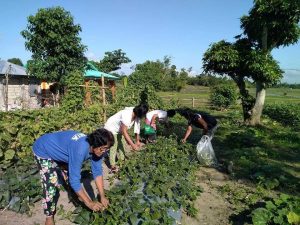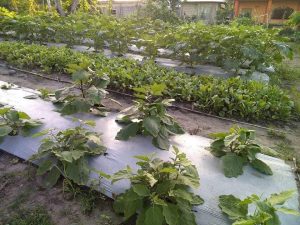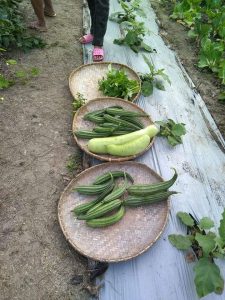 Barangay Batu, Enrile Cagayan is one of the least accessible barangays of the town. The community which is roughly 10 kilometers from the town proper, it is only accessible through an undeveloped dirt road which could be problematic during the rainy season. That and the scarceness of available public transport forced village residents to hike to the nearest village to hitch a ride. With that, the flow of goods and products to the barangay is slow if not difficult which has greatly affected the availability of a steady source of food.
Barangay Batu, Enrile Cagayan is one of the least accessible barangays of the town. The community which is roughly 10 kilometers from the town proper, it is only accessible through an undeveloped dirt road which could be problematic during the rainy season. That and the scarceness of available public transport forced village residents to hike to the nearest village to hitch a ride. With that, the flow of goods and products to the barangay is slow if not difficult which has greatly affected the availability of a steady source of food.
On January 21, 2015, the Municipal Inter-Agency Committee (MIAC) of Enrile crafted the Municipal Transition Plan in which one of the objectives of the plan would be to encourage Pantawid Pamilya beneficiaries to be self-reliant in terms of food production. Thus the establishment of a communal garden came to be.
For barangay Batu, this was a step-up, because as much as the community was willing to provide a larger area and the manpower for it, it was apparent that the community was not very skilled in various technologies on large-scale vegetable production as well as the materials and equipment for it. To address this, the Department of Social Welfare and De velopment (DSWD) through its Municipal Action Team (MAT) collaborated with the Department of Agriculture (DA) as well as the Local Government Unit (LGU) for assistance.
During various meetings on August 2018, the LGU through its Municipal Social Welfare and Development Office (MSWDO) and Municipal Agriculture Office (MAO) committed to provide the technical assistance whenever necessary. Further, a Cash for Work was organized by the local barangay council for the establishment of a garden site which included plot preparation and fencing. DA on the other hand assured to provide for the planting materials and equipment.
On October 16, 2018, the communal garden was launched which was attended by members of the community, the MIAC, DSWD-Regional Program Management Office and DA. Aside from the tools, DA turned over six types of vegetable seeds and seedlings namely, string beans, upo, patola, petchay, eggplant, okra and squash. The community also supplemented with available planting materials such as kangkong.
Overwhelmed with the support, the community set out to institute a scheme for the maintenance of the communal garden which included a daily schedule for watering the plants and a monthly upkeep which features weeding, clearing, fertilizing and the like. Pantawid beneficiaries divided themselves into four groups, with each group having several plots to maintain.
Fifteen days after the seeds were planted in a germination plot, a staff from the MAO assisted the group in transplanting the young plants as well as in proper maintenance so as to prevent mortality. He further supplemented with information on proper care and maintenance as well as organic fertilizing using materials that can be gathered around the community.
Within three months of cooperation, the garden was able to produce a good harvest for the community with the exception of the eggplant which still needed more time to mature. Instead of dividing the produce among themselves, the group opted to create a profitable source for the continuous upkeep of the garden. The group came up with a “Pick and Pay” scheme copied from practices of Baguio City farmers where the public is allowed to pick from the garden which will be weighed and paid at reduced prices compared to market prices. This way, even transportation of produce is avoided and fresh food is always made available to everyone.
With the sales, the group intends to revolve it for the future purchase of planting materials while also keeping a revolving fund that will be used as a small micro-finance or financial assistance for members of the group in crisis situations.
“Masarap sa pakiramdam na maging kaming benepisyaryo ng programa ng gobyerno, may naitutulong din sa aming barangay upang masolusyonan ang kakulangan ng pagkukunan ng masustansiyang pagkain.” (It feels good that even as beneficiaries of government programs we are able to help our barangay in solving the lack of source of healthy food) says one of the parent leaders. Indeed, they have embodied the town’s mantra: “Nalolohon nu Pavurulunan” (Easier when working together).
###Story by George Maguigad

